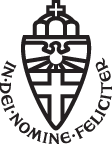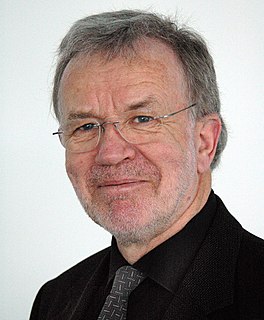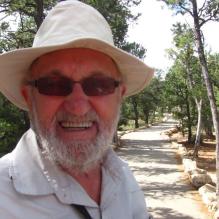
George Armitage Miller was an American psychologist who was one of the founders of cognitive psychology, and more broadly, of cognitive science. He also contributed to the birth of psycholinguistics. Miller wrote several books and directed the development of WordNet, an online word-linkage database usable by computer programs. He authored the paper, "The Magical Number Seven, Plus or Minus Two," in which he observed that many different experimental findings considered together reveal the presence of an average limit of seven for human short-term memory capacity. This paper is frequently cited by psychologists and in the wider culture. Miller won numerous awards, including the National Medal of Science.

Radboud University (abbreviated as RU, Dutch: Radboud Universiteit, formerly Katholieke Universiteit Nijmegen) is a public research university located in Nijmegen, Netherlands. The university bears the name of Saint Radboud, a 9th century Dutch bishop who was known for his intellect and support of the underprivileged.
Michael Tomasello is an American developmental and comparative psychologist, as well as a linguist. He is professor of psychology at Duke University.
Doreen Kimura was a Canadian psychologist who was professor at the University of Western Ontario and professor emeritus at Simon Fraser University. Kimura was recognized for her contributions to the field of neuropsychology and later, her advocacy for academic freedom. She was the founding president of the Society for Academic Freedom and Scholarship.

The Psychonomic Society is one of the primary societies for general scientific experimental psychology in the United States. It is open to international researchers, and almost 40% of members are based outside of North America. Although open to all areas of experimental and cognitive psychology, its members typically study areas such as learning, memory, attention, motivation, perception, categorization, decision making, and psycholinguistics. Its name is taken from the word psychonomics, meaning "the science of the laws of the mind".
John Robert Anderson is a Canadian-born American psychologist. He is currently professor of Psychology and Computer Science at Carnegie Mellon University.

Alan David Baddeley, is a British psychologist. He is known for his research on memory and for developing the three-component model of working memory. He is a professor of psychology at the University of York.
The Cognition and Brain Sciences Unit is a branch of the UK Medical Research Council, based in Cambridge, England. The CBSU is a centre for cognitive neuroscience, with a mission to improve human health by understanding and enhancing cognition and behaviour in health, disease and disorder. It is one of the largest and most long-lasting contributors to the development of psychological theory and practice.

Henkjan Honing is a Dutch researcher. He is professor of Music Cognition at both the Faculty of Humanities and the Faculty of Science of the University of Amsterdam. He conducts his research under the auspices of the Institute for Logic, Language and Computation, and the University of Amsterdam's Brain and Cognition center.
Bertram Gawronski is a Social Psychologist and Professor of Psychology at the University of Texas at Austin. He is known for his research in the areas of attitudes, social cognition, decision making, and moral psychology.

Anna Christina Nobre, FBA, MAE, fNASc, known as Kia Nobre is a Brazilian and British cognitive neuroscientist working at the University of Oxford in the United Kingdom.

Wolfgang Prinz is a German cognitive psychologist. He is the director of the Max Planck Institute for Human Cognitive and Brain Sciences in Leipzig, Germany, and an internationally recognized expert in experimental psychology, cognitive psychology and philosophy of mind. He is the founder of the common coding theory between perception and action that has a significant impact in cognitive neuroscience and social cognition.

Susan Goldin-Meadow is the Beardsley Ruml Distinguished Service Professor in the Departments of Psychology, Comparative Human Development, the college, and the Committee on Education at the University of Chicago. She is the principal investigator of a 10-year program project grant, funded by the National Institute of Child Health and Human Development, designed to explore the impact of environmental and biological variation on language growth. She is also a co-PI of the Spatial Intelligence and Learning Center (SILC), one of six Science of Learning Centers funded by the National Science Foundation to explore learning in an interdisciplinary framework with an eye toward theory and application. She is the founding editor of Language Learning and Development, the official journal of the Society for Language Development. She was President of the International Society for Gesture Studies from 2007–2012.

John Morton, OBE, FRS is an emeritus professor at the Institute of Cognitive Neuroscience and was the director of the former Medical Research Council (MRC) Cognitive Development Unit (CDU) at University College London.
Glyn W. Humphreys was a British cognitive neuropsychologist and academic. He was the Watts Professor of Experimental Psychology and principal investigator for the CNN Lab at Oxford University. He had previously worked at the University of Birmingham in the School of Psychology, where he held an honorary professorship of Cognitive Psychology. He died on 14 January 2016.

Avishai Henik is an Israeli neurocognitive psychologist who works at Ben-Gurion University of the Negev (BGU). Henik studies voluntary and automatic (non-voluntary/reflexive) processes involved in cognitive operations. He characterizes automatic processes, and clarifies their importance, the relationship between automatic and voluntary processes, and their neural underpinnings. Most of his work involves research with human participants and in recent years, he has been working with Archer fish in order to examine evolutionary aspects of various cognitive functions.

Harold Bekkering is a Dutch professor of cognitive psychology at the Donders Institute for Brain, Cognition and Behaviour of the Radboud University Nijmegen. His research has covered many different ways of learning, ranging from basic sensorimotor learning to complex forms of social learning. Lately, he aims to implement knowledge about human learning in educational settings.
Paul Bertelson (1926–2008), was an internationally recognized experimental cognitive psychologist.
Suparna Rajaram, Distinguished Professor of Psychology at Stony Brook University, is an Indian-born cognitive psychologist and expert on memory and amnesia. Rajaram served as Chair of the Governing Board of the Psychonomic Society (2008) and as President of the Association for Psychological Science (2017-2018). Along with Judith Kroll and Randi Martin, Rajaram co-founded the organization Women in Cognitive Science in 2001, with the aim of improving the visibility of contributions of women to cognitive science. In 2019, she received the Psychonomic Society Clifford T. Morgan Distinguished Leadership Award for sustained leadership and service to the discipline of cognitive psychology.
Michelene (Micki) T. H. Chi is a cognitive and learning scientist known for her work on the development of expertise, benefits of self-explanations, and active learning in the classroom. Chi is the Regents Professor, Dorothy Bray Endowed Professor of Science and Teaching at Arizona State University, where she directs the Learning and Cognition Lab.











